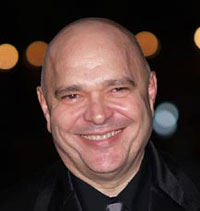 I admit, I was feeding a hunger for vampires when I initially tuned into “New Amsterdam,” which airs Mondays on FOX. I was hoping to find my new David Boreanaz in the series’ star, Nikolaj Coster-Waldau, or at least my new Angel in Coster-Waldau’s character, John Amsterdam. (The show’s name also refers to New York, where the action takes place.) But what I found was something different, but stirring in a slightly different way than I’d expected.
I admit, I was feeding a hunger for vampires when I initially tuned into “New Amsterdam,” which airs Mondays on FOX. I was hoping to find my new David Boreanaz in the series’ star, Nikolaj Coster-Waldau, or at least my new Angel in Coster-Waldau’s character, John Amsterdam. (The show’s name also refers to New York, where the action takes place.) But what I found was something different, but stirring in a slightly different way than I’d expected.
Amsterdam is a detective, inscrutable in his own way to colleagues and families of New York’s victims, as he is one of those people who, annoyingly to those around him, seems to know everything. But there’s a good reason that he’s a walking encyclopedia: he’s lived in New Amsterdam since the time of the Lenape Native Americans–instead of having been cursed by gypsies with a soul, Amsterdam is rewarded with immortality for saving a girl from certain death.
It’s unclear if this reward is really a curse–Amsterdam’s immortality means that he will always outlive his friends and loved ones–but the caveat it comes with establishes the emotional heart for this show which is really a procedural cop show with clashing partners (see also, Life, some episodes of Law & Order, etc). Amsterdam’s immortality will end when he finds his one true love and the partners give themselves to each other.
The show’s brooding leading man is living a life that is essentially endless. He maintains that as years pass and he encounters people of varying levels of victimhood and perp-itude, “change is the only constant” (a theory in direct opposition to the tenets espoused by my TV physician, Dr. House, who says that “people lie” and “people don’t change”). What he really means is that you can’t stop the world from moving, time from passing, people from aging and dying as he remains constant.
But the one constant within Amsterdam is his yearning for love, which has heightened stakes from the usual character search–by searching for his one true love, he searches for an end to his immortality, which I found unusual and beautiful. He’s looking for closure for other people, the people touched by his cases, and closure for himself. Plus, this search pretty much guarantees a string of love scenes as he searches, gives himself to the ones who could be the one, and encounters disappointment again.
Although the PR on love is that it is timeless–time stops, you want to spend forevers, etc–the truth may be that love, the time before it happens and the time after it ends, is what seems to have no end. In those moments is the essential human immortality, in which we all behave like we’re invincible masters of our own destiny. But when we meet someone and fall in love, as John Amsterdam hopes to find out, that is when we feel our humanity most keenly, our mortality poses a threat, which is why observing someone’s flaws can be so difficult: flaws indicate humanity, which indicates mortality, which indicates an eventual end.


